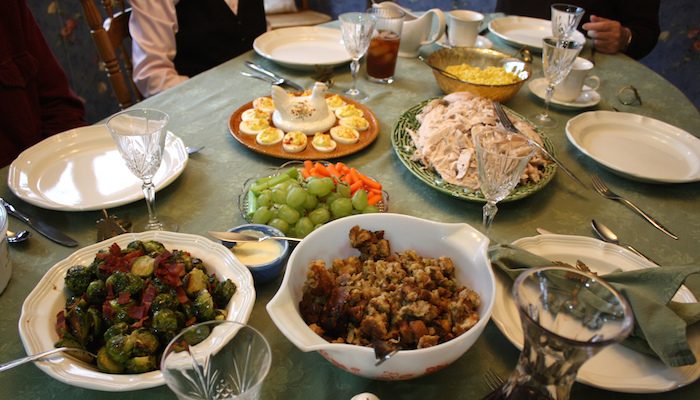
My Associate Dean approached me this morning with a handful of papers for me to sign and a request: could I prepare a short speech for the school’s annual Thanksgiving Dinner the next night?
Our Associate Dean is tied up at an official event and can’t be there and I imagine that, as the only native English speaker left in the coordination team now, I was the obvious choice. I don’t mind, of course, after all I am a professor and a little basic research on the history of the holiday pulled together in 24 hours could easily be fashioned into a speech by someone who speaks to (or at least speaks at) people for a large part of each day. If I am honest I also don’t mind speaking to the gathered faculty, students, and staff at Thanksgiving because it is one of the rare times when these three groups and their families come together for a truly social occasion during the year.
But what to say?
The international historian in me isn’t really convinced by the Thanksgiving myth that has established itself over the course of a couple of centuries. The idea that settlers and Native Americans were breaking bread together and on entirely friendly terms is not something I can relate to students with a rather large asterisk and a couple of references to the conquest of the United States and the local peoples by the Europeans who arrived. Yet neither would I go so far as to describe the day as a celebration of genocide – it would take a very unfair reading of the motivations of most Americans to read the day as an annual ritual commemorating death, disease, and destruction.
I will volunteer to go ten rounds with any student who wants to take on the topic of cultural amnesia, mythmaking, and the pros and cons of European settlement for Native American populations in my office or classroom, but for this one evening I decided to talk simply about the things that we have to be grateful for, the things that we can truly give thanks for in our university.
On my part, I’m thankful for the team of professors I get to work with every day at CEFAM. They are dedicated to their craft, to their students, and the school. They work too long and too hard for too little money but they rarely complain. I’m thankful I get to call them colleagues.
I’m thankful for the pedagogy team I work with here, the team of people who make sure that the classrooms are booked, the photocopying is done, the students know where they have to go, and who will work tirelessly to ensure that things run smoothly inside and outside of the classroom.
I’m thankful for my students. Yes, they drive me round the bend sometimes, they frustrate me, and they don’t always live up to the expectations I have for them. Yet sometimes they do. And sometimes they exceed those expectations, surprising me and others with their passion, their commitment, and their enthusiasm for learning. The students, as any teacher will tell you, make the job worthwhile.
I’m thankful for the colleague whose office sits across the hall from mine who is always quick with a joke or a word of commiseration when the day is getting too long. I’m thankful for the IT technician who uses his magic to restore the research article I had spent weeks working on and was sure I had accidentally deleted. I’m thankful for the cleaners who don’t question the coffee cup rings that inevitably stain my desk after a day spent writing and researching – their usually anonymous work makes the next morning all the easier to deal with.
There is much to give thanks for in my job and at CEFAM. I’m blessed in that I get to write, think, talk, research, and otherwise communicate about things I enjoy for a living. Pausing once a year to be thankful for this in the company of my friends, colleagues, and students reminds me of all that I have.
* * *
There’s a line in an episode of The West Wing that has always stuck with me. In a discussion over nuclear proliferation a British dignitary explains to a White House staffer that the US must give an awful lot of money to Pakistan in order to avoid that state launching a nuclear missile. The White House staffer asks why, to which the Brit responds “That’s the price you pay.” Incensed, the staffer demands, “The price we pay for what?”
The Brit responds, “For being rich, free, and alive – all at the same time.”
If you, too, are rich, free, and alive, I hope you’ll stop for a moment or two and be grateful just as we will here at CEFAM, and as hundreds of millions of Americans from New York to Los Angeles and Anchorage to Miami will, too.
Happy Thanksgiving.
Further Reading on E-International Relations
- Does Denuclearization Mean Giving up North Korea’s ‘Treasured Sword’?
- Opinion – Factors Giving Rise to Xi Coup Rumours in China
- Thinking Global Podcast – Dov Waxman
- The Importance of Media Literacy in the Classroom
- Now Recruiting – IR Theory Editors
- Now Recruiting – International Security Commissioning Editors